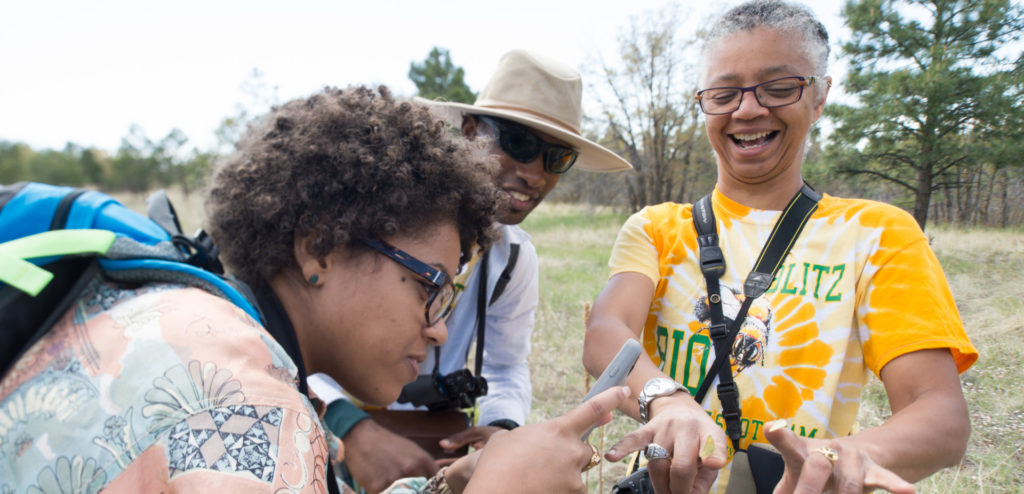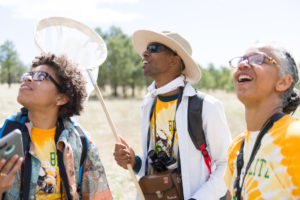
“Diversity and gender issues are really being challenged right now. It’s important to honor the importance of gender and diversity in scientific research and leadership and, in particular, ecology as a discipline needs to reflect the diversity of the human spirit.” – CSU Research Scientist Gillian Bowser
If you want to have a more diverse classroom and university, you can’t just create a program and hope that students will apply. Gillian Bowser, Colorado State University research scientist, has dedicated her career to learning more about barriers that under-represented students might perceive about ecological research, and implementing programs to overcome those barriers. She’s found success in bringing a diverse group of students into ecology and science by designing classes and programs that emphasize the importance of community and leadership.
Bowser, a researcher in the Department of Ecosystem Science and Sustainability, was recognized for her efforts last week by the Ecological Society of America. She will receive the Commitment to Human Diversity in Ecology Award at the society’s annual meeting in August.
“We need to make sure everybody feels included in ecology and be aware of the internal and external biases that may exclude some segments of our society,” said Bowser, who is also affiliated with the Department of Ethnic Studies.
People might think that ecologists come from a rural setting, instead of an urban environment. That myth makes Bowser, who grew up in Brooklyn, chuckle. “We need to get rid of the vision that all ecologists have to grow up in the great outdoors,” she said.
A ‘tireless advocate’ on diversity, inclusion
John Hayes, dean of the Warner College of Natural Resources, said that Bowser has been a tireless advocate for increasing the ethnic and racial diversity of the study body, and really, the entire field of ecology. “Her insights and experience have been invaluable as a member of Warner College’s standing committee on diversity and inclusion,” he said.
In 2010, Bowser and Mark Brown, director of CSU’s Office for Undergraduate Research and Artistry, secured funding from the National Science Foundation to establish the Rocky Mountain Sustainability and Science Network. The program brings diverse undergraduates to Yellowstone and Grand Teton National Parks for hands-on field experiences with scientists, with an aim of sparking enthusiasm for environmental science.

Bowser said it gives students the opportunity to develop into leaders in sustainability, biodiversity and community engagement in the protection of natural resources.
“Students have said that they’ve never thought about ecology before applying for the program,” said Bowser. “So we’ve accomplished the eye-opening as well as providing students with a peer network within the discipline, and that’s a critical start.”
The academy is supported by the National Science Foundation, Beacham O’Malley Trust and the National Park Service. Now in its eighth year, it has more than 100 alumni, many of whom work at universities, non-governmental organizations or federal agencies in science positions.
“That’s the most fulfilling,” said Bowser. “Seeing where those students are today and that they keep in touch with each other as part of the community.”
Student use smartphone apps for citizen science projects
The research scientist’s latest project is 3dNaturalist and the Pollinator Hotshots. These are designed to introduce minority students to citizen science, community engagement and national parks by connecting them with big data projects through smartphone apps, and other technological approaches.
Students work with practitioners, academics and agency managers through workshops and internships. For some, this means field work in Peru and the United Kingdom, where they’ll track pollinator decline with smartphones and GoPro cameras.
Bowser has focused her career on increasing opportunities for women and minorities in science, internationally as well as in the United States. For the last eight years, she has advocated for the inclusion of gender in climate solutions as part of the Women’s Major Group at the United Nations climate change talks. She helped launch the Global Women Scholars Network as a National Science Foundation project linking women scholars around the world and is one of a team of international researchers and authors working on the Global Environmental Outlook and the Global Gender and Environmental Outlook. This is a first-of-its-kind project led by the United Nations Environment Programme to assess environmental states and trends through a gender lens.